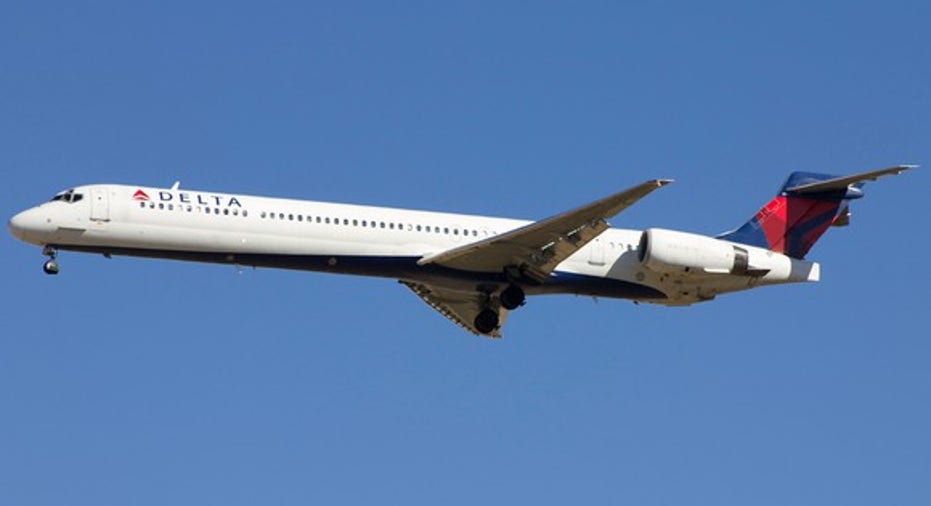5 Highlights From Delta Air Lines, Inc.'s Q4 Earnings Call

On Thursday morning, Delta Air Lines (NYSE: DAL) reported a steep earnings decline for the fourth quarter. Rising labor costs combined with ongoing unit revenue weakness to take a bite out of the company's profit margin.
Delta expects its profit margin to decline further in the first half of 2017. However, profitability could start to improve again thereafter. Here are five key points that Delta's management emphasized on the earnings call to help investors understand the company's future earnings trajectory.
Revenue trends are starting to improve
During 2016, airlines like Delta suffered from a fare war affecting the last-minute tickets often booked by business travelers. Hauenstein gave the example of a major business market in which the fare for a business day trip plunged from $750 to as low as $119.
Fares for last-minute airline bookings plummeted during 2016. Image source: The Motley Fool.
This fare war is finally winding down. Today, the same-day fare for that business market has recovered to $350. The improvement in corporate fares has helped Delta stabilize its unit revenue performance over the past two months. Getting corporate fares back to historical levels represents a huge opportunity to improve unit revenue over the next few years.
Cost pressure will increase in 2017
During 2017, Delta will face a significant cost headwind from rising fuel prices. However, non-fuel costs are also set to increase this year. For the first quarter, Delta forecast that its adjusted non-fuel cost per available seat mile will rise 5%-7%.
Some of that cost growth is being driven by the timing of Delta's recent pilot pay increase, as well as the schedule of maintenance events within the year. For the full year, non-fuel unit costs will increase at a more moderate 2%-3% rate. Still, that's higher than what Delta has experienced in recent years.
Delta's management noted that the company has handed out big pay raises in the past few months. In future years, wages will likely rise at a slower rate. Furthermore, as the unit revenue environment improves, Delta will be able to boost its productivity by increasing asset utilization. That should also contribute to slower unit cost growth in 2018 and beyond.
Targeted growth is working
Delta Air Lines has been more aggressive than its rivals during the past five years in trying to build up new hubs. Expanding in New York, Los Angeles, and Seattle is key to Delta's long-term network plans. Right now, those markets are outperforming in terms of returning to unit revenue growth.
Delta's strong results in Seattle and Los Angeles are particularly encouraging in light of the company's future growth plans. Last week, Delta announced that it will add seven new nonstop destinations from Seattle during 2017. The carrier also plans to move to new terminal space in Los Angeles by the end of 2018. This will give Delta room to start expanding in LA again.
Going upmarket in Europe
Delta will introduce premium economy seats on some long-haul routes later this year. Image source: Delta Air Lines.
Europe has been one of the big weak spots for Delta recently. The U.S. legacy carriers and their partners in Europe are facing an influx of competition from ultra-low-cost carriers in the U.S.-Europe market. This trend is likely to continue for the foreseeable future.
Delta plans to react to these headwinds by doubling down on its strengths. It will focus more of its service on the London, Paris, and Amsterdam markets where its joint venture partners operate hubs. Delta will also upgrade its first class seats (Delta One, in company parlance) and add a premium economy section on certain routes. In short, Delta is moving upmarket in order to appeal to travelers who aren't just looking for the cheapest fare.
Donald Trump could help Delta
Delta executives were very optimistic when asked for their thoughts about the incoming Trump administration. Management sees President-electDonald Trump as a potential ally on the issue of restricting the growth of state-owned Middle Eastern carriers in the U.S. Delta has argued that unfettered growth by the likes of Emirates, Qatar Airways, and Etihad Airways will destroy American jobs by forcing U.S. airlines to scale back their international service.
Additionally, Trump's tax reform plan would lead to a lower corporate tax rate for Delta (and thus higher profits). His regulatory reform agenda could also help by reducing the cost of operating the Trainer, Pennsylvania, oil refinery that Delta owns. Even if Trump doesn't carry out his complete agenda, there's a lot of potential upside for Delta Air Lines.
10 stocks we like better than Delta Air Lines When investing geniuses David and Tom Gardner have a stock tip, it can pay to listen. After all, the newsletter they have run for over a decade, Motley Fool Stock Advisor, has tripled the market.*
David and Tom just revealed what they believe are the 10 best stocks for investors to buy right now... and Delta Air Lines wasn't one of them! That's right -- they think these 10 stocks are even better buys.
Click here to learn about these picks!
*Stock Advisor returns as of January 4, 2017
Adam Levine-Weinberg is long January 2017 $40 calls on Delta Air Lines. The Motley Fool has no position in any of the stocks mentioned. The Motley Fool has a disclosure policy.



















